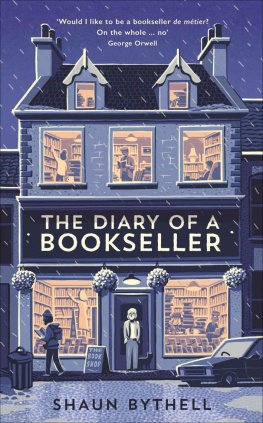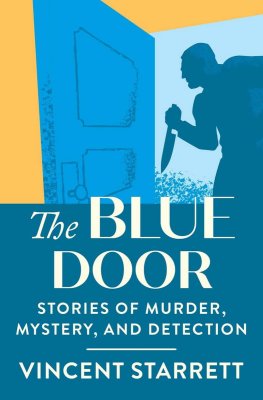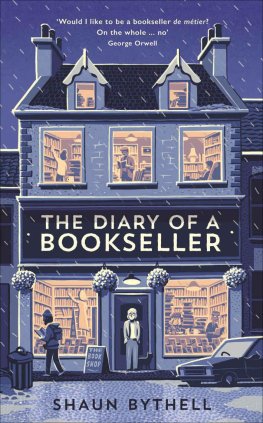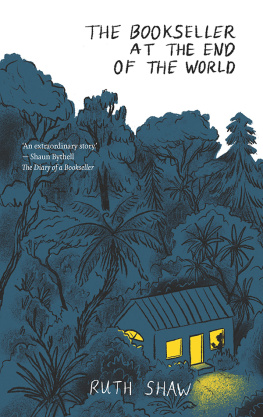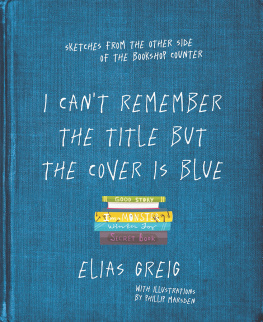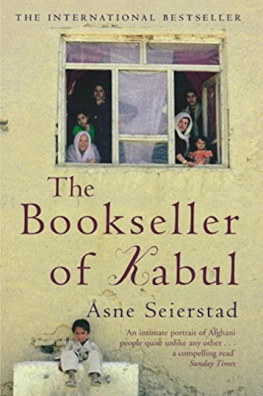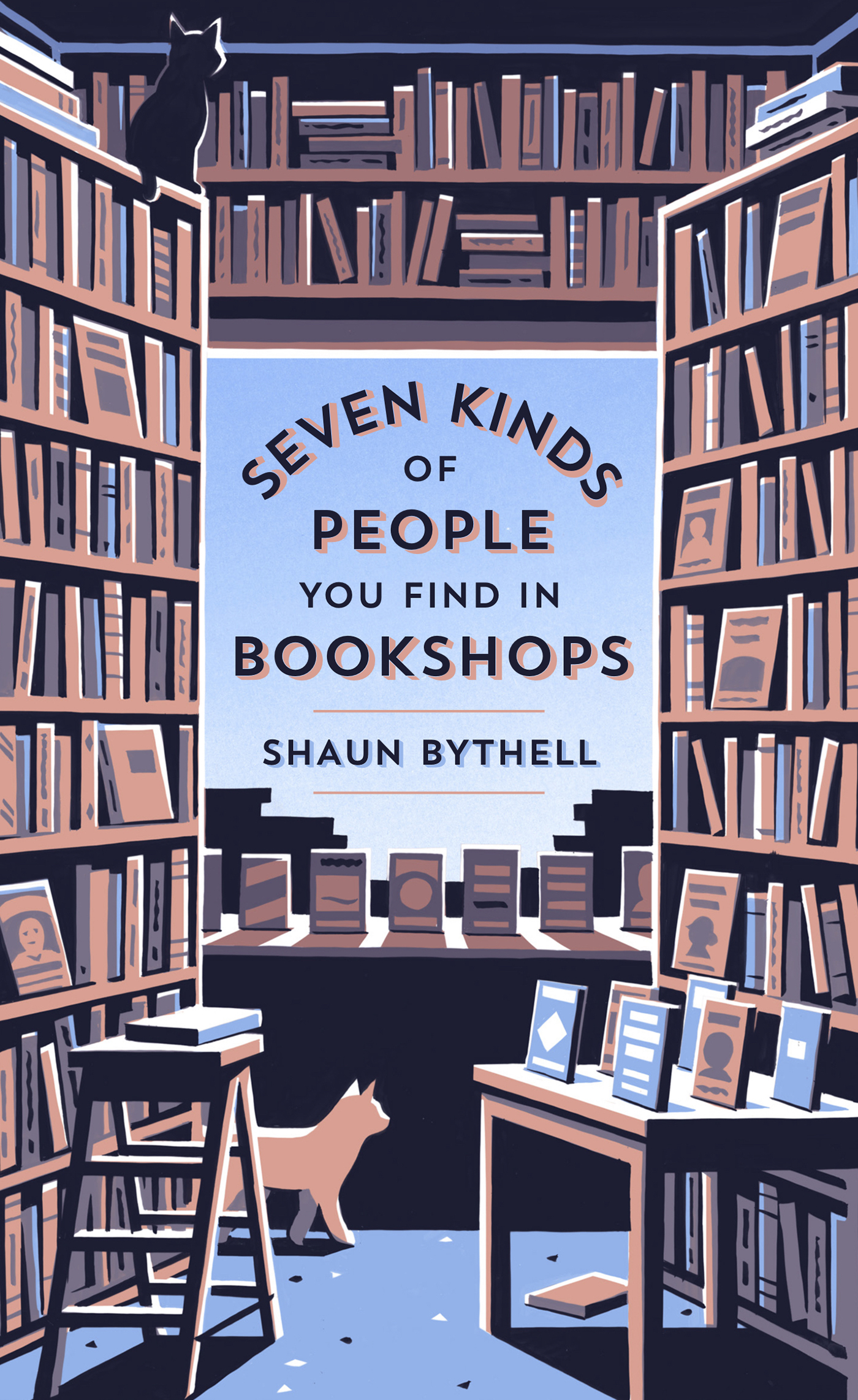Seven Kinds
of
People
You Find
in
Bookshops
also by shaun bythell
Diary of a Bookseller ( 2018 )
Confessions of a Bookseller ( 2020 )
Published in 2020 by
David R. Godine, Publisher, Inc.
Boston, Massachusetts
www.godine.com
All Rights Reserved.
No part of this book may be used or reproduced in any manner whatsoever without written permission from the publisher, except in the case of brief quotations embodied in critical articles and reviews. For more information, please visit our website.
library of congress cataloging-in-publication data
Names: Bythell, Shaun, author.
Title: Seven kinds of people you find in bookshops / Shaun Bythell.
Description: Boston : David R. Godine, Publisher, 2020 . |
Identifiers: lccn 2020028387 | isbn 9781567926927 (hardcover) | isbn 9781567926934 (ebook)
Subjects: lcsh : Bythell, Shaun. | Antiquarian booksellersAnecdotes. | Booksellers and booksellingAnecdotes. | Book collectorsAnecdotes. | Characters and characteristicsAnecdotes.
Classification: lcc z325.b97 s48 2020 | ddc 381/.45002dc23
LC record available at https://lccn.loc.gov/ 2020028387
Cover Art Jon McNaught
Cover Design Alex Camlin
Interior Design Brooke Koven
note : Our edition of Shaun Bythells Confessions of a Bookseller retained the authors U.K. spelling and punctuation. We have again retained Bythells spelling and punctuation here, so as not to water down the texts unique vernacular.
for Lena and Freya
Contents
Introduction
I n his preface to Antiquarian Books: An Insiders Account (David & Charles, 1978 ) Roy Harley Lewis wrote that the role played by antiquarian books in world trade is, financially, quite insignificant. That is putting a flattering spin on it. If you replace the word antiquarian with second-hand, then the financial impact on the global economy shifts from quite insignificant to laughably trifling. It was into that world that I stepped when I bought a bookshop in 2001 , just four years after Amazon started selling cut-price books online. I now dream of my business making as much as even a laughably trifling dent in the global economy. In a further sign of appalling business acumen, Im now responsible for this book, which attempts to bracket my customers unkindly into broad categories which will undoubtedly offend the very people on whom I depend for a living. This should surely seal my financial fate.
Roy Harley Lewis concludes in his preface:
one might ask why the bookseller should be any more interesting than the shoe salesman. Yet there can be few other careers that offer such satisfaction or that make such demands as the antiquarian-book trade, requiring the dealer to play at different times the roles of detective, scholar, agent, psychologist, and fortune-tellerquite apart from that of conventional buyer and salesman.
He may have a point. Or it may be that those of us who are singularly ill-equipped to deal with the stresses of normal life find ourselves drawn towards the business as a means of escaping from roles of the conventional buyer and salesman. This isnt about us, though, the miserable, unfortunate few who have chosen to try to sell books to make a pitiful living. It is about our customers: those wretched creatures with whom were forced to interact on a daily basis, and whoas I write this under coronavirus lockdownI miss like long-lost friends. From the charming and interesting to the rude and offensive, I miss them all. Apart from the fact that without them I have literally no income, to my enormous surprise I have discovered that I miss the human interaction. Yesterday, a man telephoned the shop and asked for a copy of my second book, Confessions of a Bookseller. The total, including postage, was . As I was taking down his credit card details, he said, Please add an extra . When I asked him why, he replied, Because I know how hard this time must be for businesses like yours, and I want you to still be there when all of this is over, so that I can come and visit the shop again.
Others have been equally kind; I recently received a cheque from someone Ive never met who told me that shed read an article in Time magazine, written by Margaret Atwood, in which she encouraged people to support small businesses during this difficult time. She asked for nothing other than that I cash the cheque. The kindness of strangers can reduce you to your knees in a sobbing mess faster than a well-aimed punch to the solar plexus. This is why I miss my customers. Despite my objection to many of them, beneath their hoary exteriors there beats a kind, human heart.
The bookshops in the title of this book really only refers to my own shop. I have no wish to tarnish the reputations of others by claiming to speak on their behalf while venting my own spleen. No doubt those booksellers of a more generous disposition would paint far kinder portraits of their customers than those that follow this introduction, but these are drawn from my experiences over the past twenty years of suffering service in the trade, and I am unaware of any booksellers with a generous dispositiontowards their customers, at least.
I ought also to apologise for perpetuating stereotypes, when in reality people are far more nuanced and exist in endless subtle shades of characteristics. Generalisations are unfair, but so is life. Suck it up.
For the purposes of convenience, and of causing further offence, Ive attempted to adopt a sort of Linnaean system of taxonomy, which, now that Ive finished the book, Ive realised doesnt really work.
1
Genus: Peritus
(expert)
I f your knowledge of Latin is as woeful as mine, then you could be forgiven for assuming (as I did) that this refers to an unsavoury part of the nether regions. It does not. It means expert.
This kind of customer ison the wholea self-appointed expert who does not have the benefit of a regular audience on which to inflict his or her wisdom. Unlike most academics, or recognised industry commentators, who generally deal in fact-based, well-informed opinion, and who have groups of students and readers keen to hear what they have to say, most of the autodidactic types that follow have no such eager audience. As always, there are exceptions, and in their ranks can be counted some of the kindest customers Im fortunate enough to encounter. The rest, though, are eye-wateringly tiresome.
There is nothing that the expert likes more than to use long words where short, simple language would suffice. Stamp-collecting becomes philately, looking at birds becomes ornithology and an unhealthy obsession with insects becomes entomology. Its as though theyve dined out and eaten Will Self for main course followed by Jonathan Meades and Stephen Fry for dessert. The difference being that Self and Meades and Fry have all swallowed, digested and understood the full Oxford English Dictionary and know precisely how to use the correct word in the right situation to bestow clarity upon their prose, while the expert takes excruciating pains to confound the reluctant listener for nothing more than the sake of obfuscation. They know fewer than five long words, but splash them around with wild abandon for no other purpose than to create the easily-scratched veneer of intellectual superiority. Butas my pharmacist friend Cloda would sayhippopotomonstrosesquipedalianism is no excuse to make someone feel foolish for not knowing that the chemical polyvinylpyrrolidone is a binding agent in most prescription tablets.


